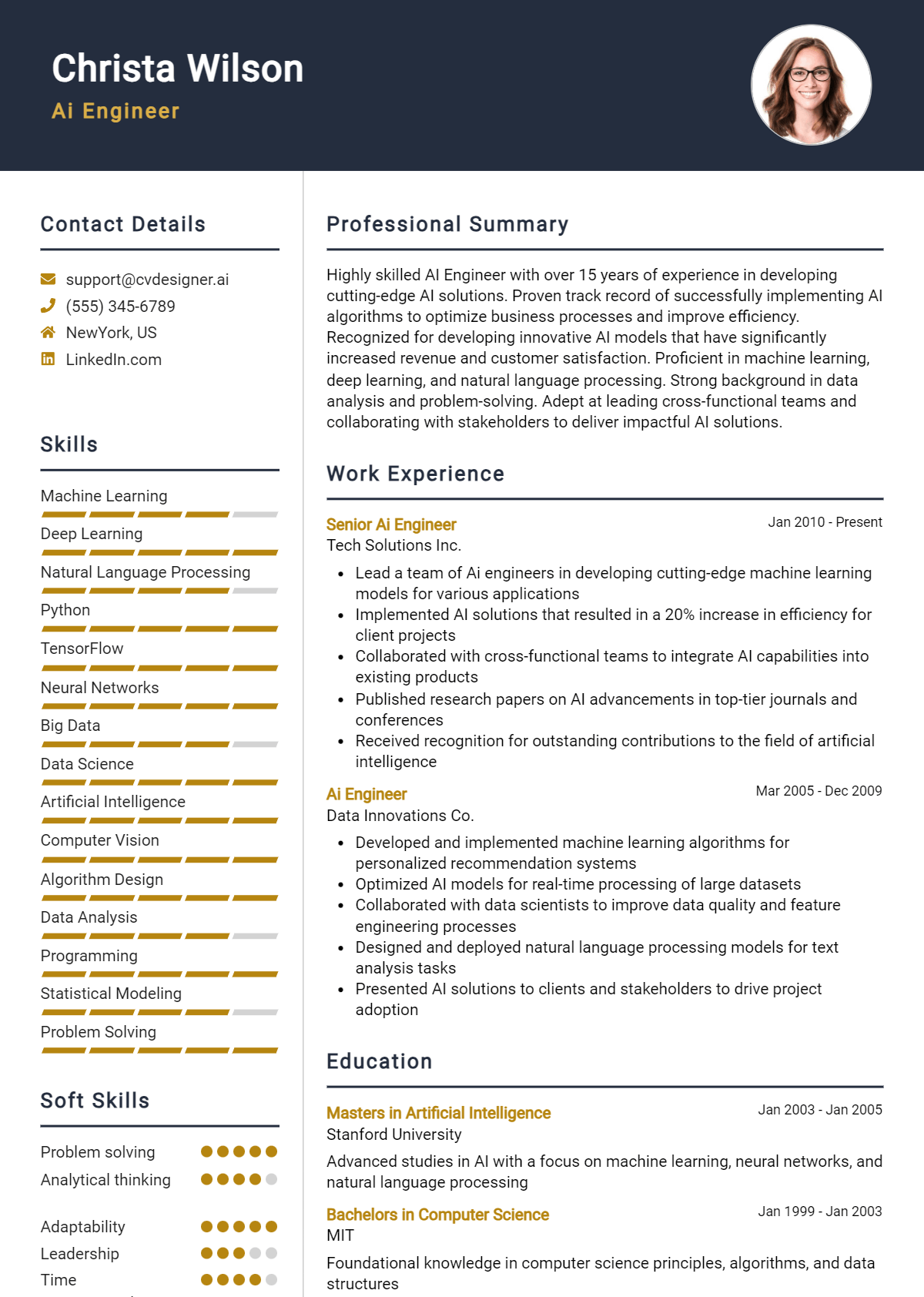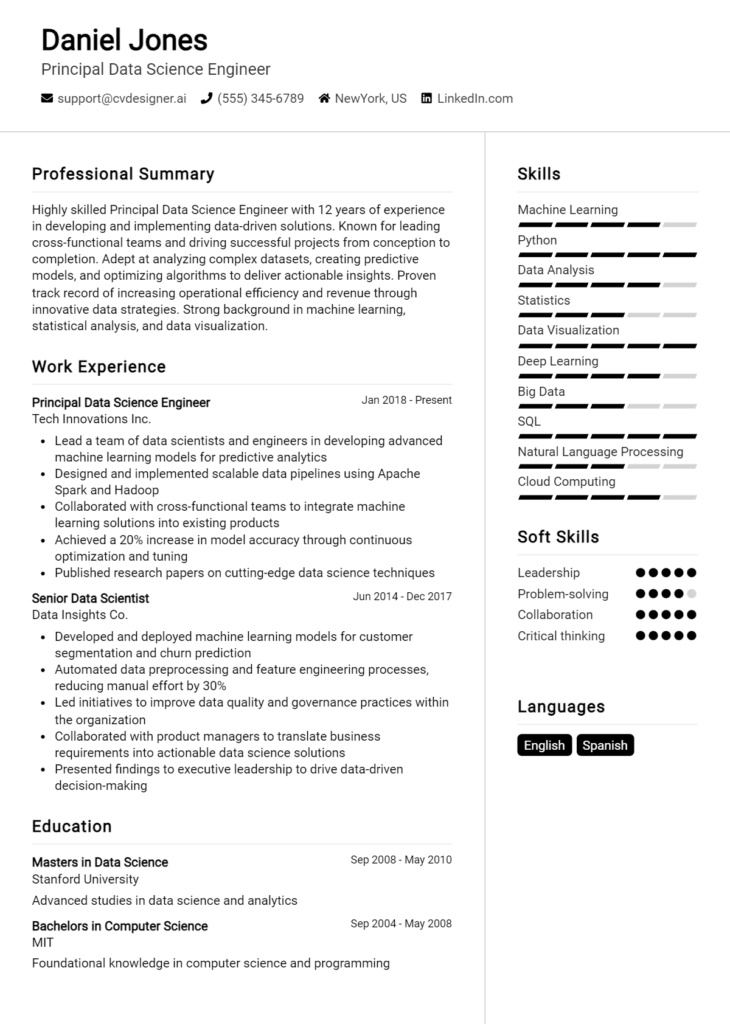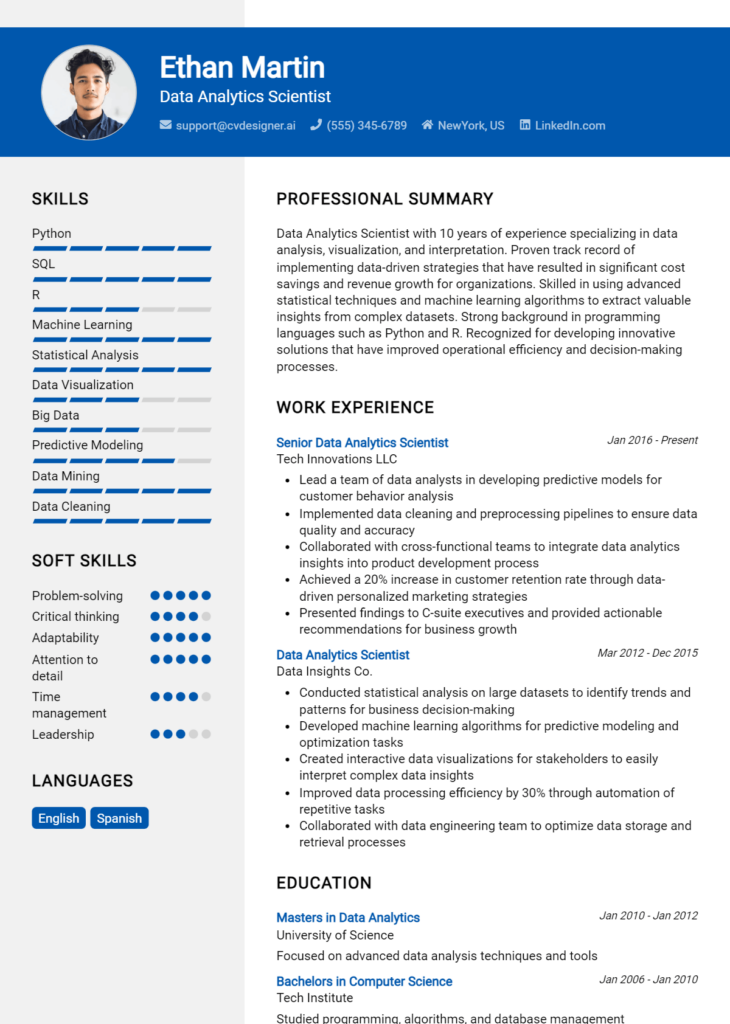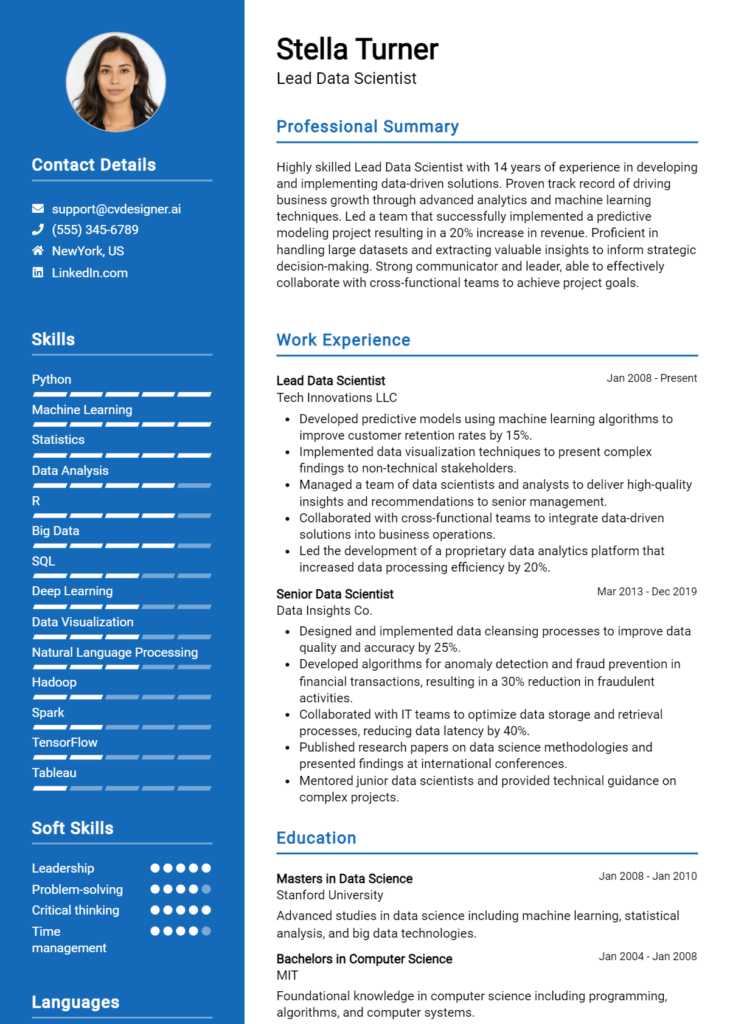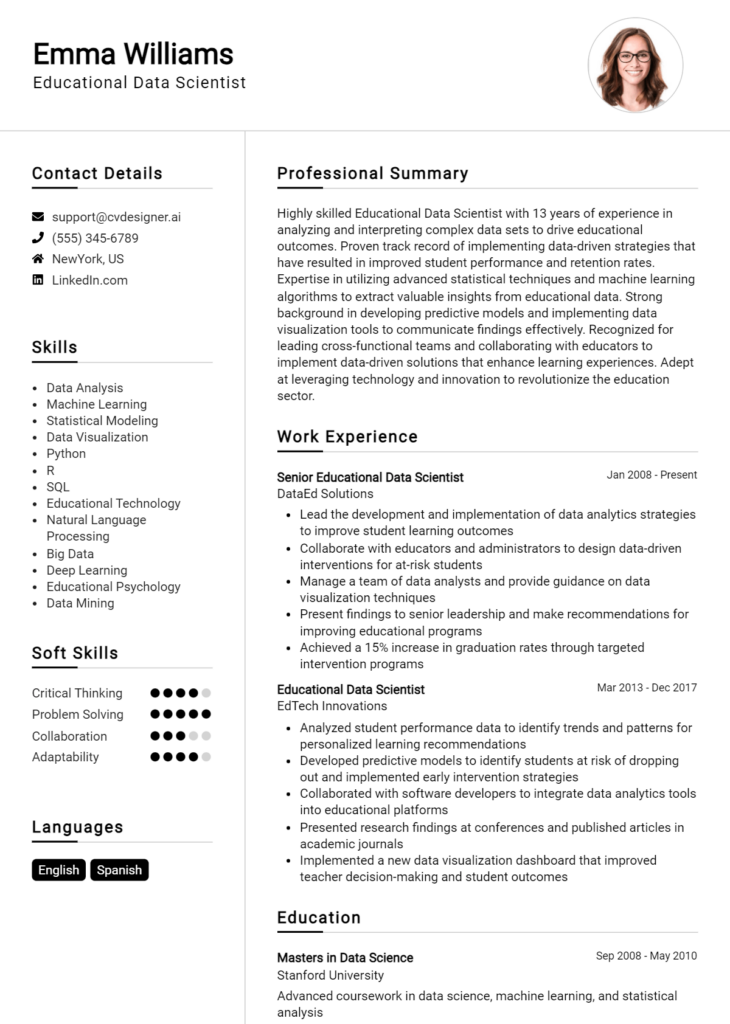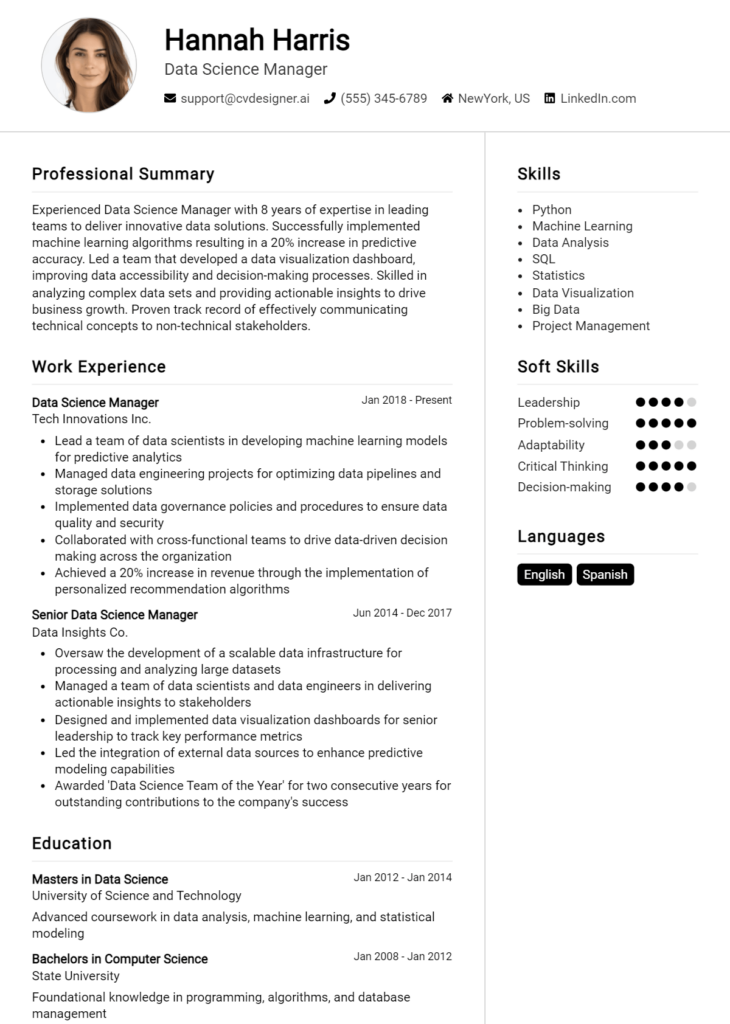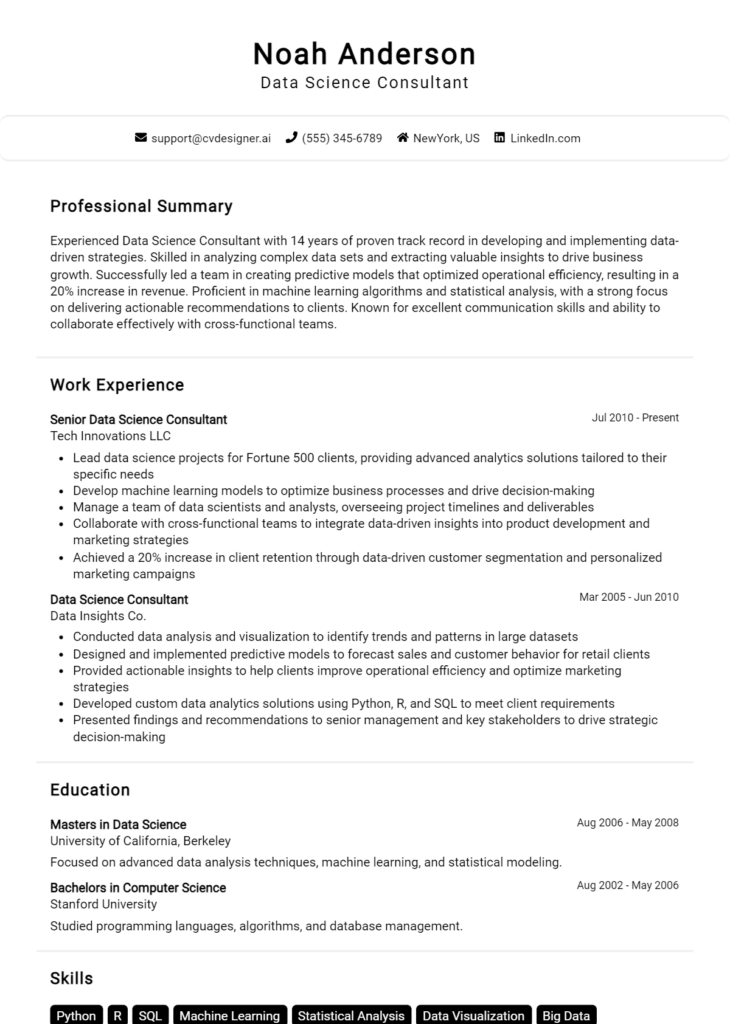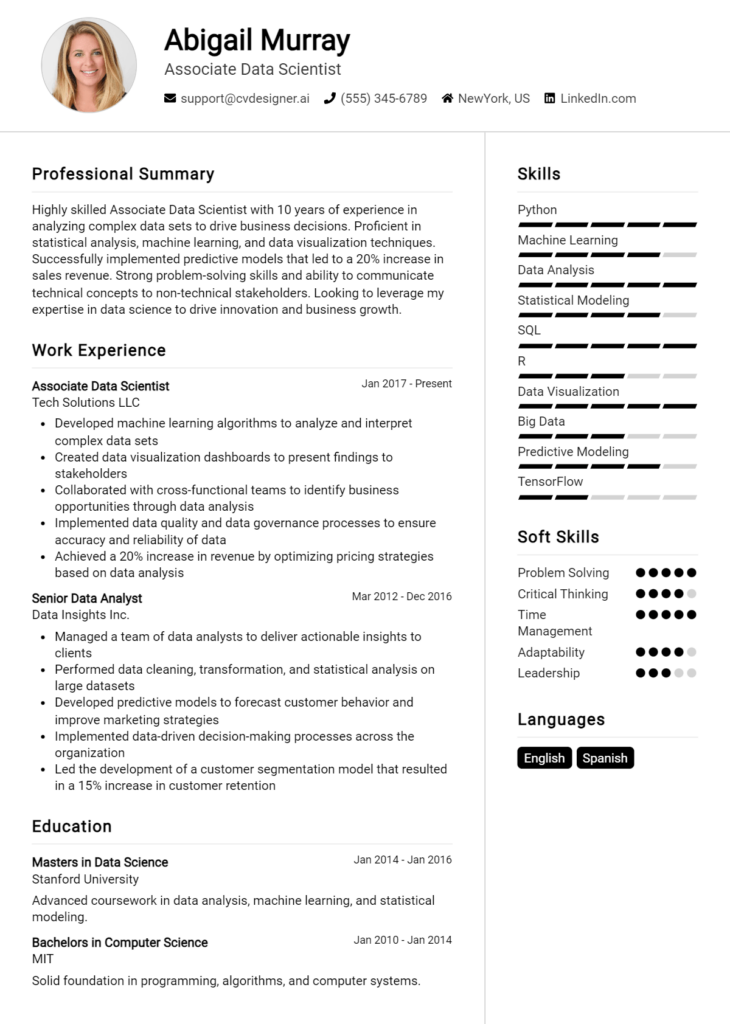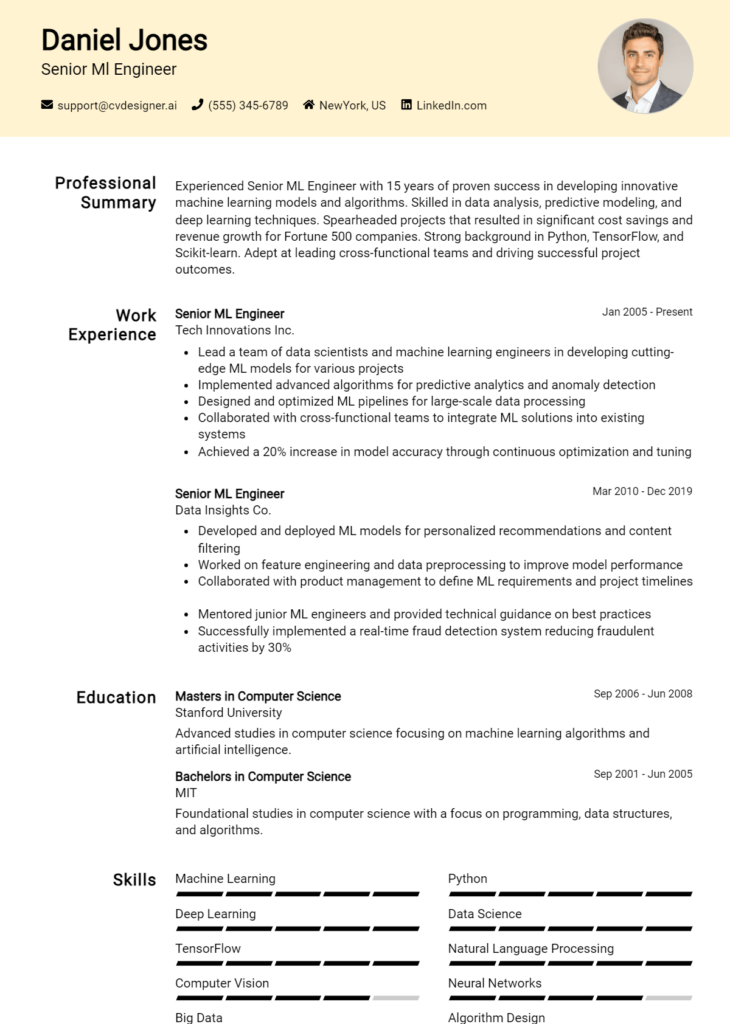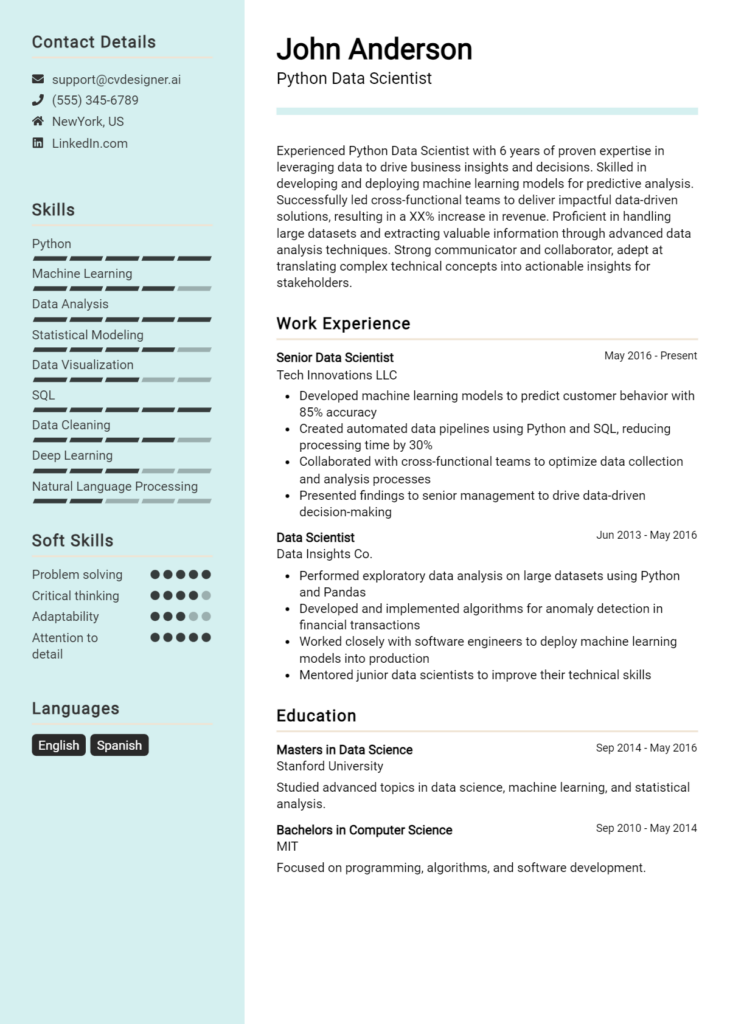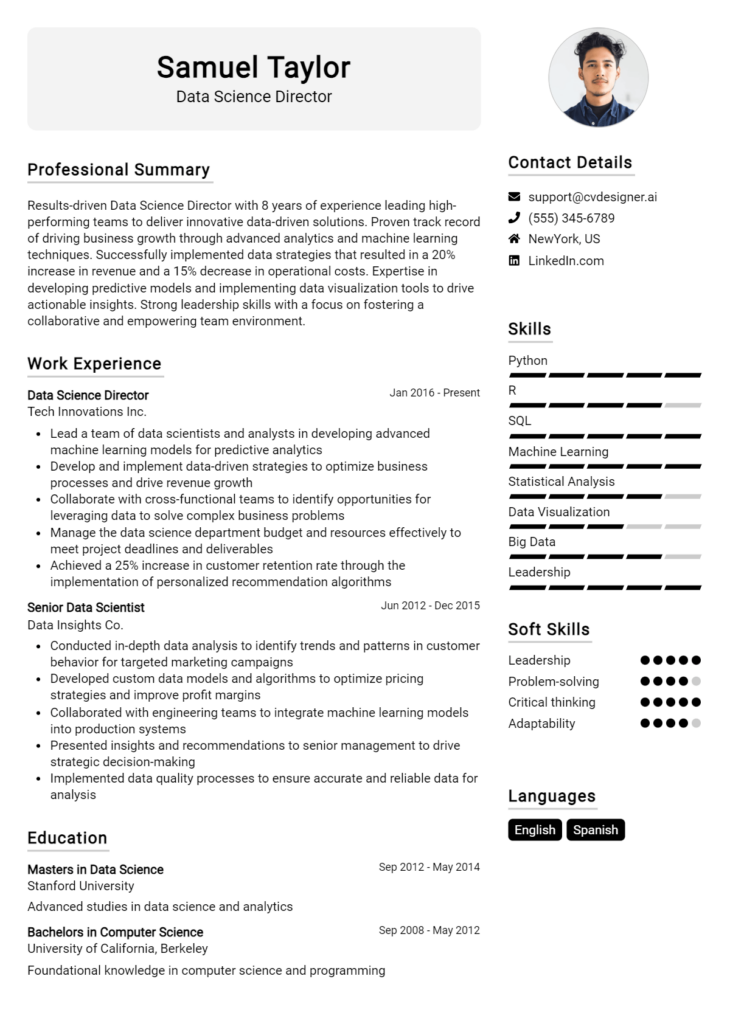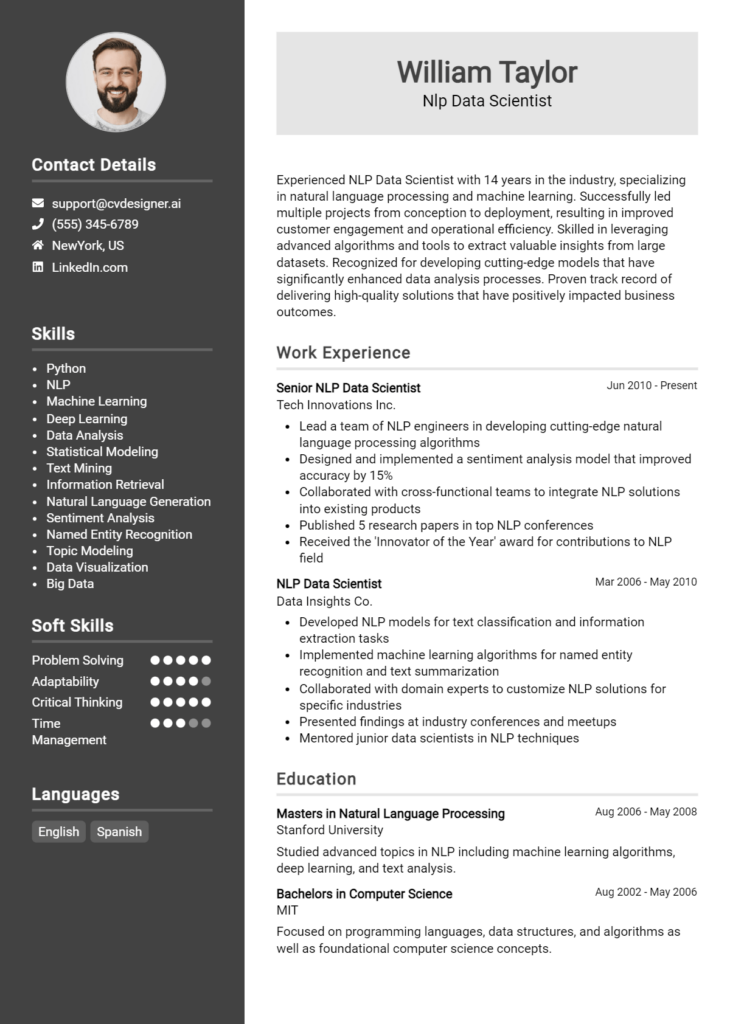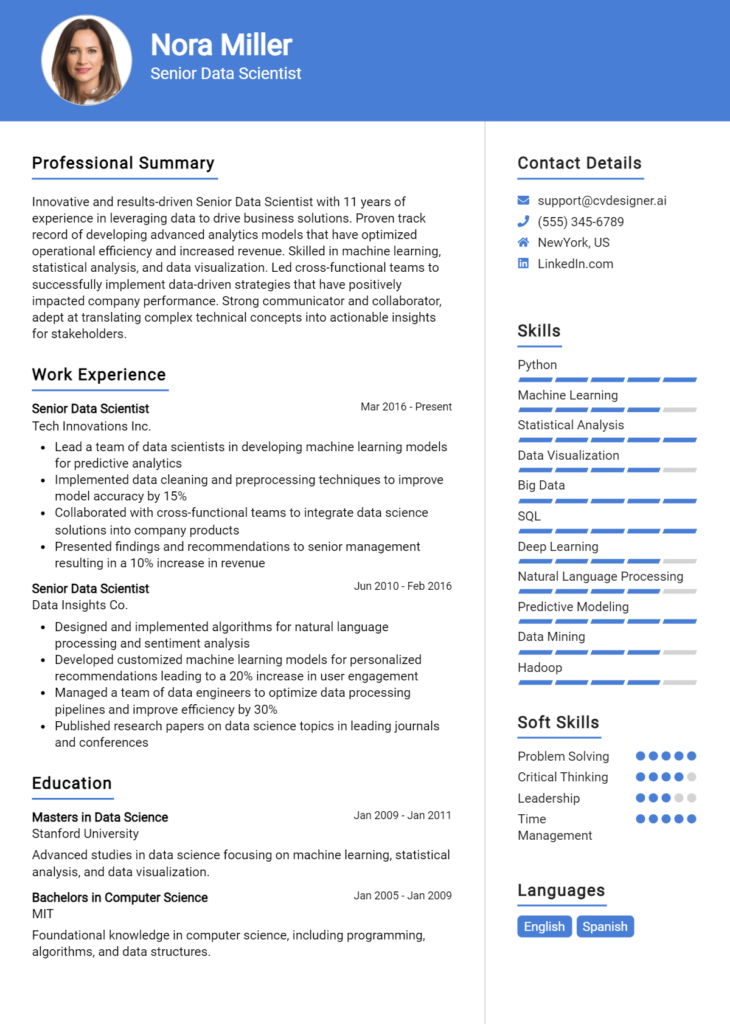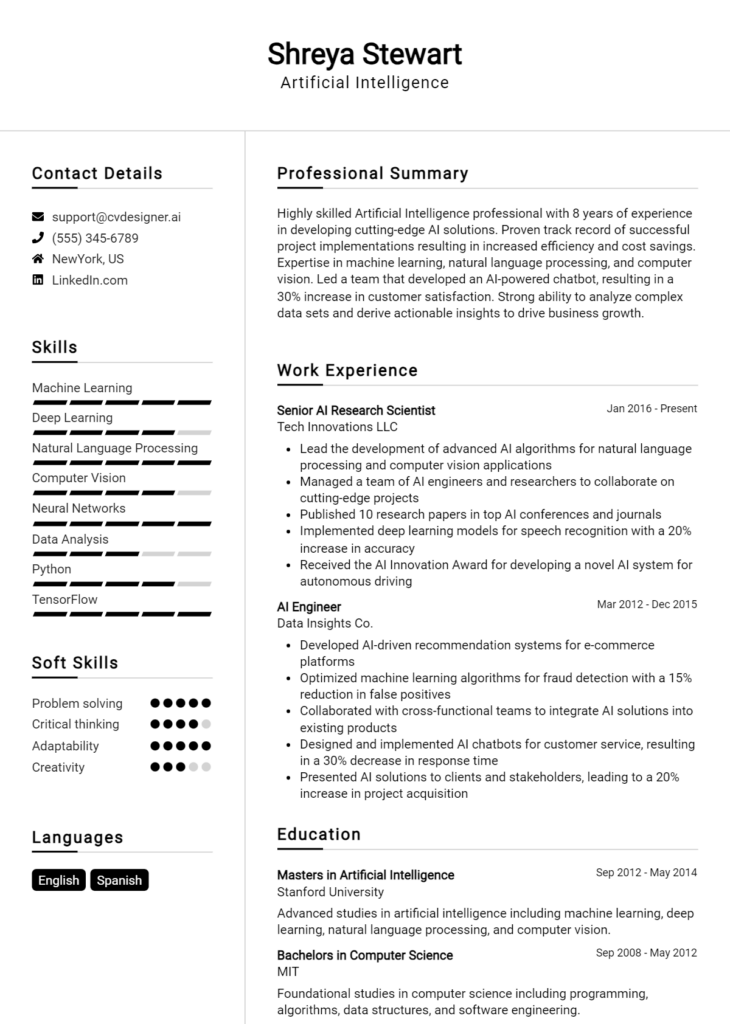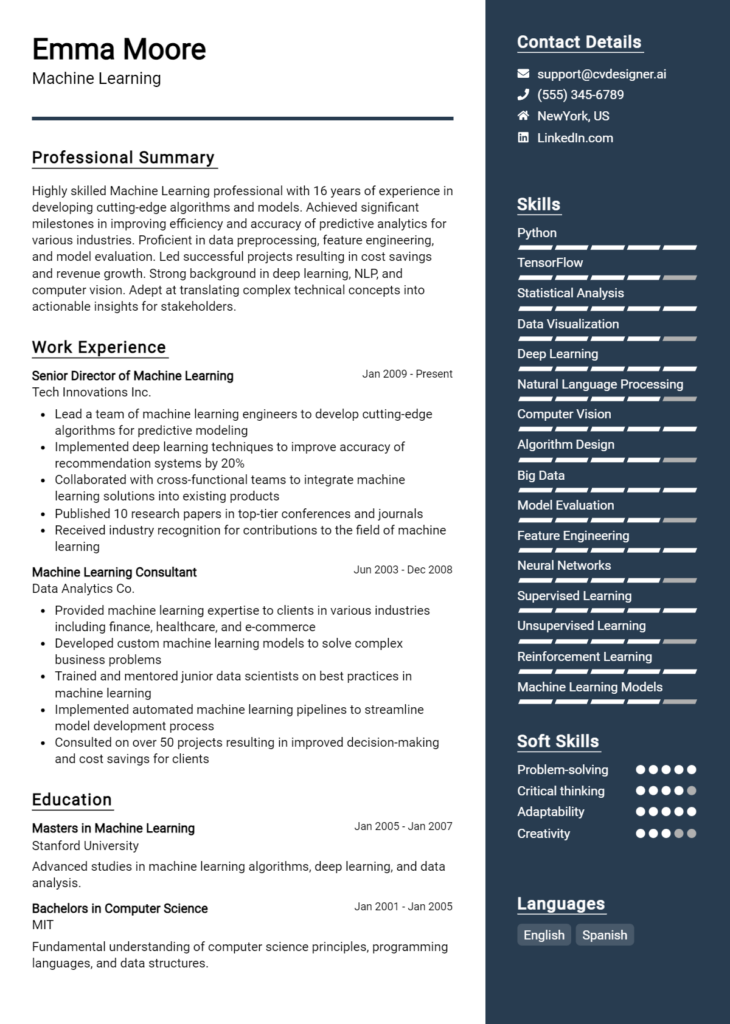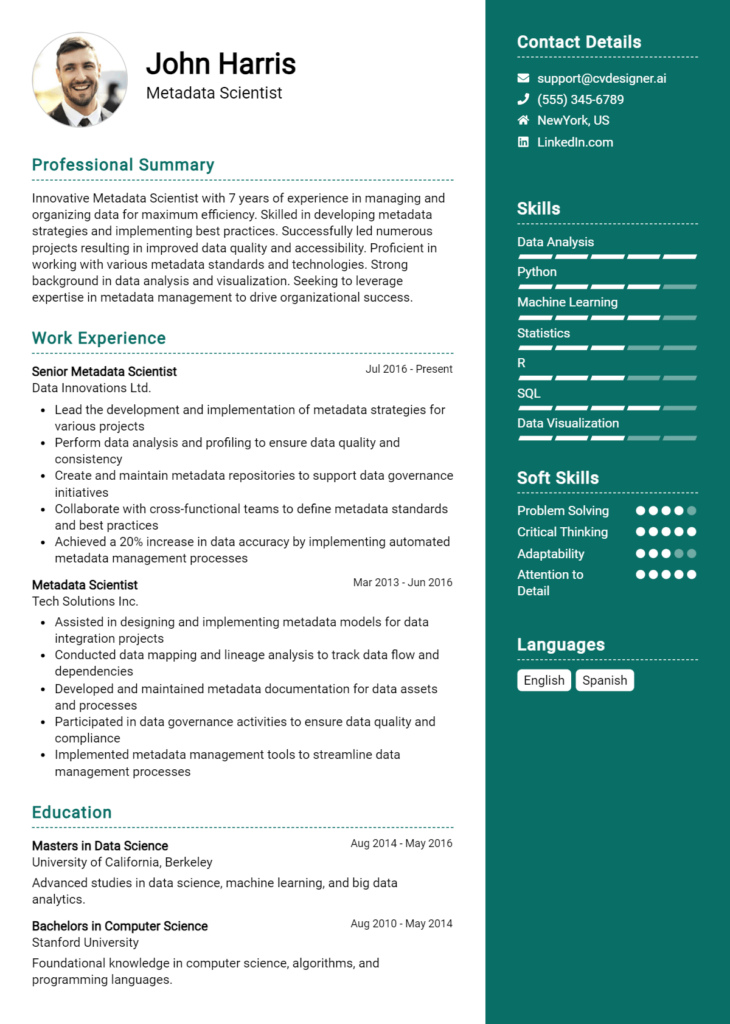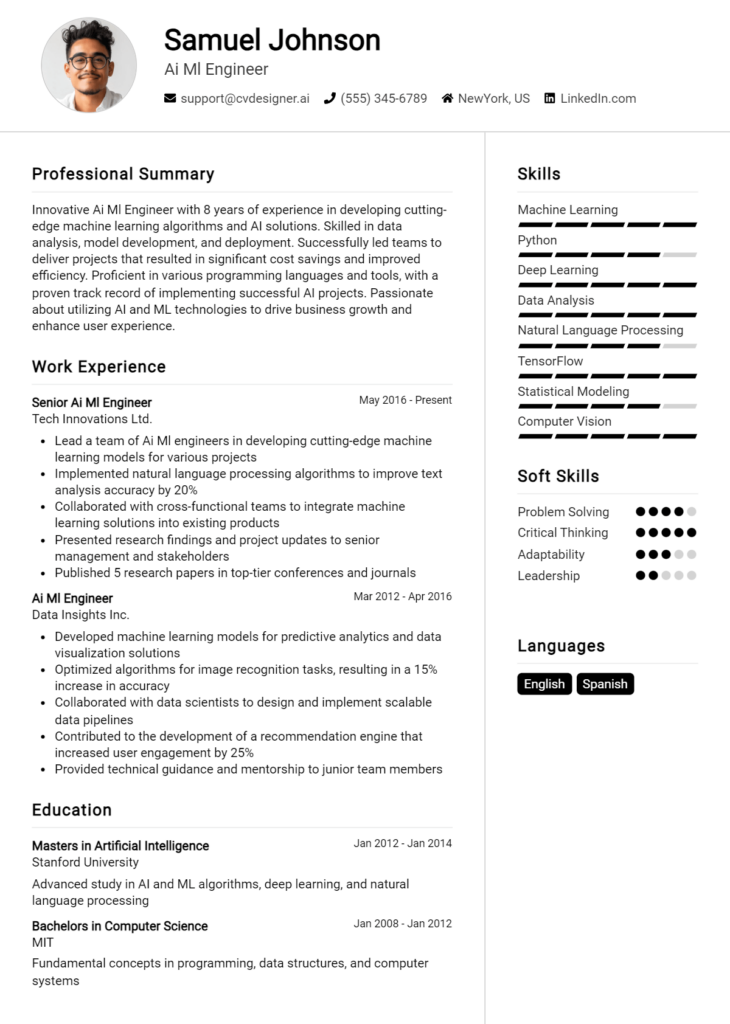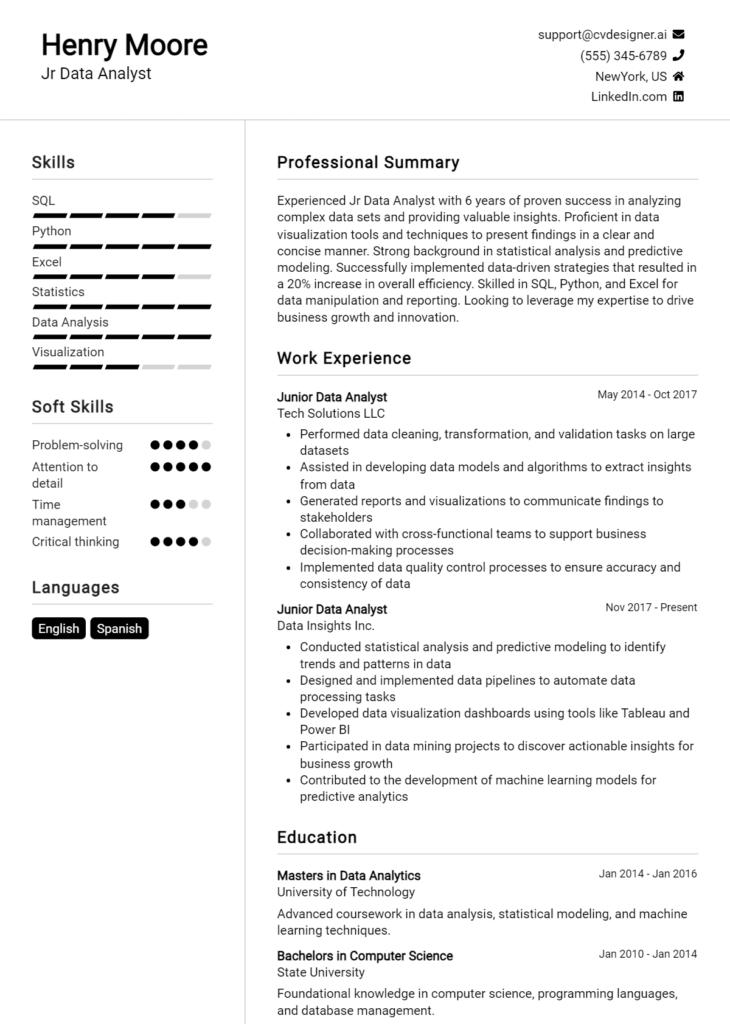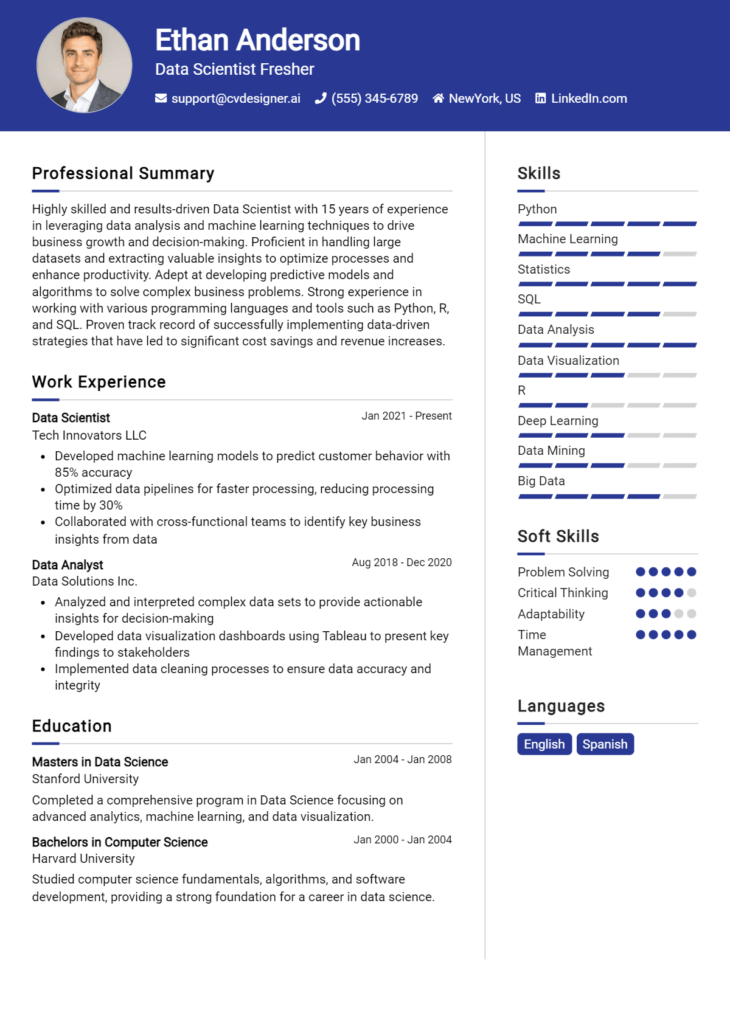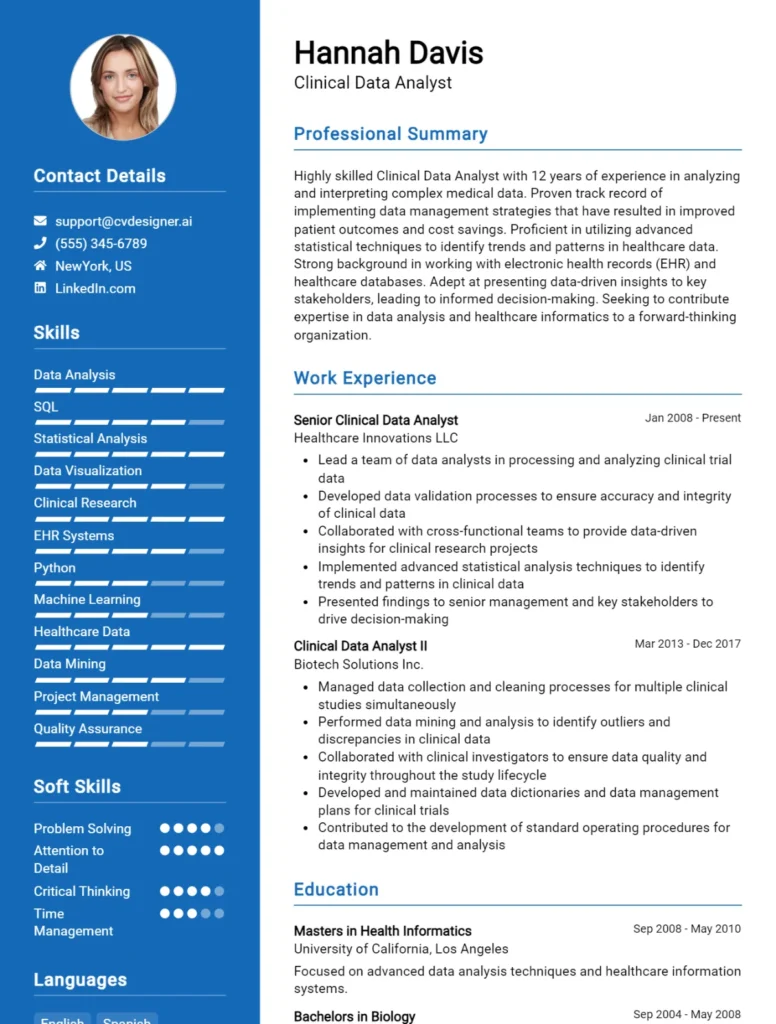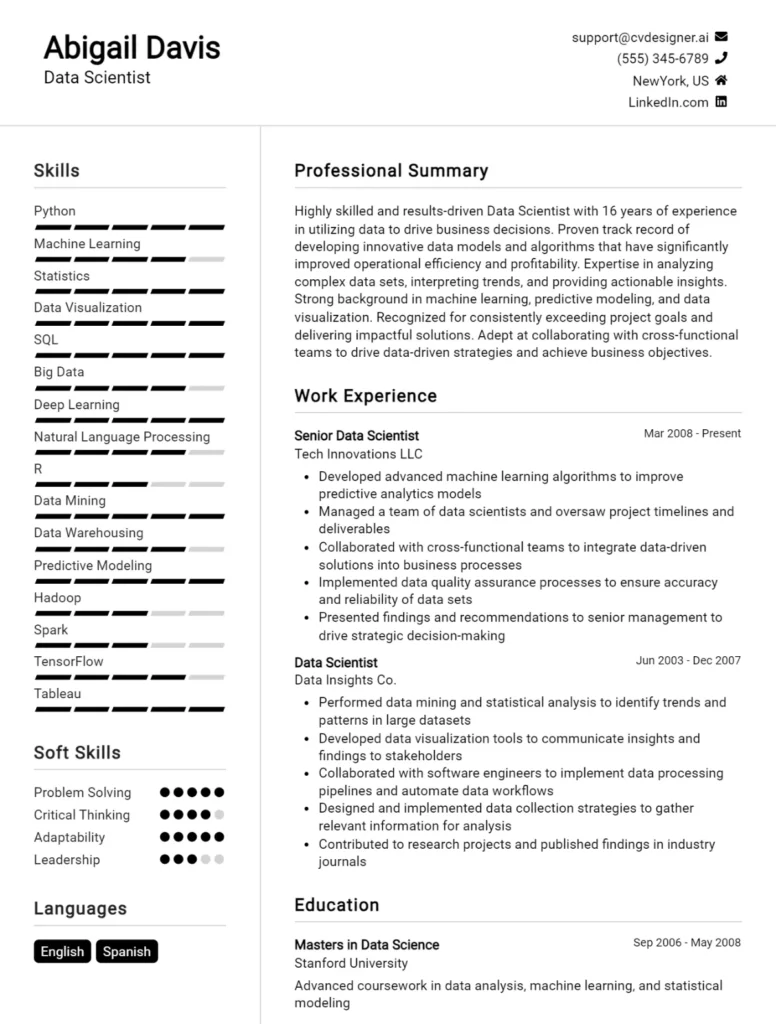Most Popular Ai Engineer CV Examples
Explore additional Ai Engineer CV samples and guides and see what works for your level of experience or role.
Are you an aspiring AI Engineer looking to land your dream job in the rapidly evolving tech landscape? Crafting an impressive CV is your first step towards making a lasting impression on potential employers. This article will guide you through the essential components of an effective AI Engineer CV, ensuring you highlight your skills and experiences in a way that stands out. We will discuss key elements such as how to showcase your technical expertise, the importance of relevant projects, tips for optimizing your CV for Applicant Tracking Systems (ATS), and how to present your educational background effectively. By the end of this guide, you'll have a clear roadmap to create a compelling CV that captures the attention of hiring managers.
- Understanding the structure of a CV: Learn how to organize your CV effectively for maximum impact.
- Highlighting technical skills: Discover which programming languages and tools to emphasize.
- Showcasing relevant projects: Tips for presenting your work experience and projects that align with AI engineering roles.
- Tailoring your CV for ATS: Key strategies to ensure your CV gets past automated screening tools.
- Educational qualifications: Best practices for listing your degrees and certifications.
- Crafting a strong summary statement: How to write an engaging summary that summarizes your expertise and career goals.
- Common mistakes to avoid: Insights into pitfalls to steer clear of in your CV writing process.
Dive into the details and equip yourself with the knowledge to create a standout CV that opens doors to exciting opportunities in the field of AI engineering!
What is a AI Engineer CV?
A CV, or curriculum vitae, is a crucial document for an AI Engineer as it showcases their skills, experience, and qualifications to potential employers. It typically includes sections on education, work history, technical skills, and projects that highlight the candidate's expertise in artificial intelligence and machine learning. A well-crafted CV not only presents a summary of one's professional journey but also serves as a marketing tool that can set an applicant apart in a competitive job market. For insights on how to create an impactful CV, refer to this cv writing guide.
The importance of a CV for an AI Engineer extends beyond just listing qualifications; it is an opportunity to demonstrate problem-solving abilities and innovative thinking, which are vital in the tech industry. A strong CV can lead to interviews and job offers by effectively communicating the engineer's unique contributions to previous projects and their relevance to the prospective employer's needs. Utilizing a cv maker can streamline the process of designing a professional CV, allowing engineers to focus on highlighting their technical accomplishments and career goals.
Key Components of a AI Engineer CV
- Contact Information: Include your full name, phone number, email address, and LinkedIn profile or personal website to provide potential employers with easy access to your professional identity.
- Professional Summary: Write a concise summary that highlights your experience and expertise in artificial intelligence, showcasing your passion for the field and what you can bring to the role.
- Technical Skills: List relevant skills such as programming languages (Python, R, Java), machine learning frameworks (TensorFlow, Keras, PyTorch), and tools (scikit-learn, OpenCV) that demonstrate your technical proficiency.
- Work Experience: Detail your work experience by including relevant job titles, company names, locations, and dates of employment, highlighting key achievements and responsibilities in each role.
- Education: Include your academic qualifications, such as degrees in computer science, artificial intelligence, data science, or related fields, along with the institutions attended and graduation dates.
- Certifications: Mention any relevant certifications, such as those from Coursera, edX, or industry-recognized organizations, that validate your expertise in AI and machine learning.
- Projects: Highlight significant AI projects you have worked on, including personal, academic, or professional projects, specifying the technologies used and the impact of your contributions.
- Publications and Research: If applicable, list any research papers, articles, or publications you have contributed to, especially those related to AI and machine learning.
- Awards and Recognitions: Include any awards or recognitions received for your work in AI, demonstrating your commitment to excellence in the field.
- Professional Affiliations: Mention any memberships in professional organizations or societies related to artificial intelligence, which can reflect your ongoing engagement with the industry.
- Soft Skills: Highlight key soft skills such as problem-solving, teamwork, communication, and adaptability that are essential for success as an AI engineer.
- Additional Information: Optionally, include any additional relevant information such as languages spoken, volunteer work, or personal interests that might enhance your CV and showcase your personality.
Sample AI Engineer CV for Inspiration
John Doe
123 AI Lane
San Francisco, CA 94105
(555) 123-4567
johndoe@email.com
LinkedIn: linkedin.com/in/johndoe
GitHub: github.com/johndoe
Professional Summary
Innovative and results-driven AI Engineer with over 5 years of experience in designing and implementing machine learning models and algorithms. Proven expertise in data analysis, natural language processing (NLP), and computer vision. Adept at collaborating with cross-functional teams to develop AI-driven solutions that enhance operational efficiency and drive business growth. Strong programming skills in Python, TensorFlow, and PyTorch, with a deep understanding of AI and machine learning principles.
Work Experience
AI Engineer
Tech Innovations Inc., San Francisco, CA
June 2020 - Present
- Developed and deployed machine learning models to improve customer segmentation, resulting in a 15% increase in targeted marketing effectiveness.
- Collaborated with data scientists to design and implement NLP algorithms for sentiment analysis, enhancing product feedback analysis capabilities.
- Led a team of 3 engineers in creating a computer vision application for real-time quality assurance in manufacturing processes, reducing defects by 20%.
- Presented findings and recommendations to stakeholders, driving data-informed decision-making processes.
Machine Learning Engineer
Data Solutions LLC, San Jose, CA
August 2018 - May 2020
- Designed and implemented predictive models for sales forecasting using time series analysis, achieving an accuracy improvement of 10%.
- Engineered data pipelines using Python and Apache Spark to streamline data processing and analysis workflows.
- Conducted A/B testing and performance tuning of machine learning models, optimizing model accuracy and efficiency.
- Authored technical documentation and provided training sessions for junior engineers on best practices in AI development.
Data Scientist
Analytics Corp, Los Angeles, CA
July 2016 - July 2018
- Analyzed large datasets to identify trends and insights, informing business strategy and product development.
- Developed algorithms for recommendation systems that improved user engagement metrics by 25%.
- Worked closely with product managers to define project scope and objectives, ensuring alignment with business goals.
Education
Master of Science in Artificial Intelligence
University of California, Berkeley
Graduated May 2016
Bachelor of Science in Computer Science
University of Southern California
Graduated May 2014
Skills
- Programming Languages: Python, R, Java, SQL
- Machine Learning Frameworks: TensorFlow, Keras, PyTorch, Scikit-Learn
- Data Analysis Tools: Pandas, NumPy, Matplotlib, Seaborn
- Cloud Platforms: AWS, Google Cloud Platform, Microsoft Azure
- Technologies: Docker, Kubernetes, Apache Spark
- Natural Language Processing: NLTK, SpaCy, GPT-based models
- Computer Vision: OpenCV, image processing techniques
Publications
- Doe, J., & Smith, A. (2021). "Enhancing Customer Experience Through AI-Driven Sentiment Analysis." Journal of AI Research, 34(2), 123-135.
- Doe, J. (2020). "A Comprehensive Study on Predictive Modeling Techniques." International Conference on Machine Learning, Proceedings, 45-52.
Certifications
- Certified TensorFlow Developer - TensorFlow Certificate Program
- AWS Certified Machine Learning - Specialty
- Microsoft Certified: Azure AI Engineer Associate
AI Engineer CV Writing Tips
When crafting a CV as an AI Engineer, it's essential to highlight both your technical expertise and your problem-solving abilities. Your CV should provide a clear and concise overview of your skills, experience, and accomplishments in the field of artificial intelligence, data science, and machine learning. Use quantifiable metrics to demonstrate the impact of your work, and tailor your CV to the specific job role you are applying for. Keep the formatting clean and professional, ensuring that key information is easily accessible to recruiters and hiring managers.
CV Writing Tips for AI Engineers:
- Tailor Your CV: Customize your CV for each job application by incorporating relevant keywords and phrases from the job description.
- Highlight Technical Skills: Clearly list your programming languages (e.g., Python, R, Java), frameworks (e.g., TensorFlow, PyTorch), and tools (e.g., SQL, Git) in a dedicated skills section.
- Showcase Projects: Include a section for personal or professional projects, detailing your role, technologies used, and the outcomes or results achieved.
- Quantify Achievements: Use specific metrics to illustrate your impact, such as "improved model accuracy by 15%" or "reduced processing time by 30%."
- Include Relevant Education: List your degrees, certifications, and any relevant coursework related to AI, machine learning, or data analysis.
- Professional Experience: Focus on your experience in AI engineering roles, emphasizing responsibilities that demonstrate your technical and analytical skills.
- Stay Updated: Mention any participation in conferences, workshops, or continuous learning initiatives to show your commitment to staying current in the field.
- Soft Skills Matter: Don’t forget to include soft skills like teamwork, communication, and problem-solving, which are essential for collaborative AI projects.
AI Engineer CV Summary Examples
As an AI Engineer, your CV summary should encapsulate your technical expertise, relevant experience, and passion for artificial intelligence. Here are several examples that highlight different strengths and areas of focus within the field:
Results-driven AI Engineer with over 5 years of experience in designing and developing machine learning models. Proficient in Python and TensorFlow, with a strong background in data analysis and natural language processing. Proven track record of delivering innovative AI solutions that improve efficiency and drive business growth.
Dynamic AI Engineer specializing in deep learning and computer vision, with a solid foundation in algorithm development and data mining. Skilled in deploying scalable AI applications in cloud environments, and adept at collaborating with cross-functional teams to integrate AI solutions into existing products.
Detail-oriented AI Engineer with expertise in reinforcement learning and predictive analytics. Over 4 years of hands-on experience in building and optimizing machine learning frameworks. Strong analytical skills combined with a passion for leveraging AI to solve complex problems in various industries.
Innovative AI Engineer with a focus on developing intelligent systems that enhance user experiences. Experienced in utilizing neural networks and big data technologies to create data-driven solutions. Committed to continuous learning and staying updated with the latest advancements in AI research.
Proficient AI Engineer with a robust background in statistical modeling and algorithm optimization. Over 6 years of experience in creating AI-driven applications for e-commerce and healthcare sectors. Excellent problem-solving skills, complemented by a strong ability to communicate complex concepts to non-technical stakeholders.
Build a Strong Experience Section for Your AI Engineer CV
As an AI Engineer, showcasing relevant experience on your CV is crucial to demonstrate your expertise and contributions to the field. Below are several examples of strong work experience descriptions that highlight key responsibilities, achievements, and skills pertinent to the role of an AI Engineer.
- Developed and implemented machine learning algorithms that improved the accuracy of predictive analytics models by 30%, leading to enhanced decision-making processes for clients in the healthcare sector.
- Collaborated with cross-functional teams to design and deploy a natural language processing (NLP) system that automated customer support responses, reducing response time by 50% and increasing customer satisfaction scores.
- Led a project to optimize deep learning models for image recognition applications, achieving a 25% reduction in processing time and a 15% increase in classification accuracy through advanced tuning techniques.
- Conducted extensive data preprocessing and feature engineering on large datasets, which resulted in a more streamlined data pipeline and improved model performance for an e-commerce recommendation system.
- Spearheaded the integration of AI-driven analytics tools into existing business processes, enabling real-time insights and predictive capabilities that drove a 20% increase in operational efficiency.
- Designed and executed experiments to evaluate various machine learning frameworks, ultimately recommending the adoption of TensorFlow, which enhanced the team’s ability to scale models for production use.
- Presented findings and insights from machine learning projects to stakeholders, effectively communicating complex technical concepts and demonstrating the tangible business impact of AI initiatives.
- Mentored junior engineers and interns in best practices for AI development and deployment, fostering a collaborative learning environment that contributed to the team's overall success and innovation.
AI Engineer CV Education Examples
As the field of artificial intelligence continues to evolve, a strong educational background is essential for aspiring AI Engineers. Below are examples of relevant educational qualifications that can help candidates stand out in this competitive industry.
- Bachelor's Degree in Computer Science: This foundational degree typically covers programming, algorithms, data structures, and software development, providing essential skills for AI model development.
- Master's Degree in Artificial Intelligence: A specialized program that delves deeper into machine learning, neural networks, and natural language processing, preparing graduates for advanced roles in AI research and application.
- Ph.D. in Robotics or Machine Learning: This advanced degree focuses on cutting-edge research and innovation in AI technologies, enabling graduates to contribute to pioneering projects and lead research initiatives.
- Bachelor's Degree in Mathematics or Statistics: A strong mathematical background is crucial for understanding algorithms and data analysis, both of which are fundamental to developing effective AI models.
- Graduate Certificate in Data Science: This program offers targeted training in data analytics, big data technologies, and statistical modeling, equipping professionals with the skills needed to handle data-driven AI projects.
Skills to Highlight in Your AI Engineer CV
As an AI Engineer, showcasing a balanced mix of both soft and hard skills in your CV is essential to demonstrate your capability in this rapidly evolving field. Prospective employers look for candidates who not only possess technical expertise but also exhibit strong interpersonal abilities and problem-solving skills. Below is a curated list of key skills that can enhance your AI Engineer CV.
Soft Skills:
- Problem-solving - Ability to analyze complex problems and devise effective solutions.
- Communication - Skill in conveying technical concepts to non-technical stakeholders.
- Teamwork - Experience collaborating within multidisciplinary teams to achieve project goals.
- Adaptability - Capacity to quickly learn new technologies and adjust to changing project requirements.
- Critical Thinking - Ability to evaluate information and make informed decisions.
- Creativity - Innovative thinking to develop novel AI solutions and approaches.
- Time Management - Proficiency in managing multiple projects and meeting deadlines effectively.
- Attention to Detail - Precision in coding and data analysis to ensure high-quality outputs.
- Empathy - Understanding user needs to design AI systems that enhance user experience.
- Leadership - Experience guiding teams and projects towards successful completion.
Hard Skills:
- Machine Learning - Proficiency in algorithms and models for predictive analytics.
- Programming Languages - Expertise in Python, R, Java, or C++ for AI development.
- Data Analysis - Skills in manipulating and analyzing large datasets using tools like Pandas or NumPy.
- Neural Networks - Experience designing and implementing neural network architectures.
- Natural Language Processing (NLP) - Knowledge in developing applications for text analysis and generation.
- Computer Vision - Skills in image processing techniques and technologies.
- Frameworks - Familiarity with TensorFlow, PyTorch, or Keras for building AI models.
- Cloud Computing - Experience with cloud platforms like AWS, Azure, or Google Cloud for deploying AI solutions.
- Version Control - Proficiency in using Git or similar tools for code management.
- Statistics - Strong foundation in statistical methods to interpret data and validate models.
AI Engineer CV Format
As an AI Engineer, showcasing your skills and experience effectively is crucial to landing your desired role. The best CV format can vary based on your level of expertise—entry-level, mid-level, or senior-level positions. Each stage of your career may require a different emphasis on your education, projects, and professional experiences. For a comprehensive overview of CV formats, you can refer to this cv format resource.
- Entry-Level AI Engineer: Focus on educational background, relevant coursework, internships, and personal projects. Highlight programming languages and tools you are proficient in.
- Mid-Level AI Engineer: Emphasize your professional experience, including specific projects and contributions. Include metrics to demonstrate the impact of your work and any leadership roles you may have undertaken.
- Senior-Level AI Engineer: Showcase your advanced technical skills, leadership experience, and strategic thinking. Include high-level projects, publications, and any mentoring or team-building activities you have facilitated.
- Technical Skills Section: Clearly list programming languages, frameworks, and AI technologies you are proficient in, tailored to the job description.
- Projects Section: Include a dedicated section for key projects, detailing your role, technologies used, and outcomes, especially for those that showcase innovation or problem-solving.
- Continuous Learning: Highlight any certifications, courses, or workshops related to AI that demonstrate your commitment to staying current in this rapidly evolving field.
Common Mistakes to Avoid in a AI Engineer CV
When crafting a CV for an AI Engineer position, it's crucial to highlight your technical skills, project experiences, and relevant education. However, many candidates fall into common pitfalls that can undermine their chances of landing an interview. To ensure your CV stands out positively, here are some frequent mistakes to avoid:
- Overloading with Technical Jargon: Using too much technical language can confuse recruiters who may not have a deep understanding of AI concepts.
- Failing to Tailor the CV to the Job Description: Not customizing your CV to align with the specific requirements and keywords from the job listing can make your application seem generic.
- Neglecting Soft Skills: Focusing solely on technical abilities and ignoring soft skills such as teamwork, communication, and problem-solving can give an incomplete picture of your capabilities.
- Listing Responsibilities Instead of Achievements: Instead of merely stating what you did, emphasize the impact of your work and quantifiable achievements.
- Including Irrelevant Information: Avoid cluttering your CV with unrelated experiences or skills that do not pertain to the AI field.
- Using an Unprofessional Email Address: Ensure your email address is professional and appropriate, as an unprofessional one can create a negative first impression.
- Ignoring Formatting and Readability: A cluttered or poorly formatted CV can distract from your qualifications; use clear headings, bullet points, and consistent fonts.
- Omitting Projects or Practical Experience: Not showcasing relevant projects, internships, or hands-on experience in AI can lead to missed opportunities to demonstrate your skills.
- Being Too Vague: Avoid vague statements; be specific about your contributions, tools used, and technologies worked with.
- Neglecting Continuous Learning: In a rapidly evolving field like AI, not mentioning any recent courses, certifications, or self-study can signal a lack of engagement with the latest advancements.
Key Takeaways for a AI Engineer CV
- Tailored Summary: Start with a strong professional summary that highlights your expertise in AI technologies, programming skills, and relevant experience.
- Technical Skills: Clearly list your technical skills, including programming languages (Python, Java, etc.), frameworks (TensorFlow, PyTorch), and tools (scikit-learn, Keras).
- Project Experience: Showcase specific AI projects you have worked on, detailing your role, technologies used, and the impact of your contributions.
- Education: Include your educational background, specifying degrees related to computer science, machine learning, or artificial intelligence.
- Certifications: Mention any relevant certifications, such as those from Google, Microsoft, or Coursera, that demonstrate your commitment to continuous learning.
- Publications and Research: If applicable, highlight any research papers, articles, or publications that showcase your expertise and contributions to the AI field.
- Soft Skills: Don’t forget to include soft skills such as problem-solving, teamwork, and communication, which are essential in collaborative AI projects.
- Professional Experience: Detail your work history, focusing on roles that involved AI development, machine learning, or data analysis, and quantify your achievements where possible.
- Networking and Community Involvement: Mention participation in AI-related communities or events, which can demonstrate your engagement with the field.
- Portfolio Links: Provide links to your GitHub or personal website where potential employers can view your work and projects.
- Use of Templates: Consider using cv templates to create a visually appealing and professional CV.
- Build with Ease: Utilize a cv builder to streamline the CV creation process and ensure a polished end product.
- Cover Letter: Complement your CV with a well-crafted cover letter using cover letter templates that reflect your passion for AI engineering.
Build your CV in minutes
Use an AI-powered cv builder and have your cv done in 5 minutes. Just select your template and our software will guide you through the process.
